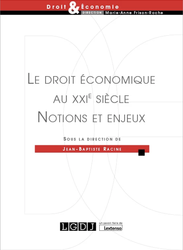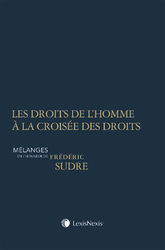April 3, 2023
Interviews

♾️follow Marie-Anne Frison-Roche on LinkedIn
♾️subscribe to the Newsletter MAFR Regulation, Compliance, Law
____
► Full Reference: M.-A. Frison-Roche & M. Boissavy, "Colloque : « Avocat et droits de la défense dans les enquêtes internes et la justice négociée »" ("Symposium: "Lawyers and rights of the defence in internal investigations""), interview with Olivia Dufour, Actu-Juridique, 3rd April 2023.
____
💬read the interview (in French)
____
► Presentation of the interview by the journal (in French): "Le Conseil national des barreaux (CNB) organise les 20 et 21 avril prochains un colloque intitulé « Avocat et droits de la défense dans les enquêtes internes et la justice négociée ». Matthieu Boissavy, avocat aux barreaux de Paris et de New York, médiateur et vice-président de la commission Libertés et droits de l’Homme du Conseil national des barreaux et Marie-Anne Frison-Roche, professeure de droit, directrice du Journal of Regulation and Compliance nous expliquent les enjeux de ces nouvelles pratiques judiciaires qui bousculent le rôle traditionnel des acteurs de la justice, qu’il s’agisse des avocats ou des magistrats."
____
► Questions asked (in French):
- Le CNB organise les 20 et 21 avril prochains un colloque sur le thème : Avocats et droits de la défense dans les enquêtes internes et la justice négociée. Pourquoi ce choix ?
- La compliance n’est-elle pas en train de bouleverser le métier d’avocat ?
- Comment cela se traduit-il en pratique ?
- Quelles sont les implications déontologiques, ne faut-il pas inventer de nouvelles règles ?
- Qu’est-ce que la CJIP a changé dans le métier d’avocat ?
- Quels sont les nouveaux risques pour l’avocat ?
- Cela modifie-t-il les relations entre avocats, parquet et juges du siège ?
________
June 28, 2022
Thesaurus
► Référence complète : Juliette Camy. La diligence des sociétés transnationales en matière de droits fondamentaux: étude de droit français et de droit anglais (devoir de vigilance et duty of care). Thèse, Nanterre- Paris X, 2022.
____
SOMMAIRE
INTRODUCTION GÉNÉRALE
PARTIE I. LA PRÉVENTION DES ATTEINTES
Titre I. Les obligations de prévention
Chapitre 1. L’identification des obligations
Chapitre 2. Les voies de réforme des obligations
Titre II. Les acteurs de la prévention
Chapitre 1. Les acteurs de la prévention dans les relations intersociétaires
Chapitre 2. Le rôle résiduel des parties prenantes de la société
PARTIE II. LA SANCTION DE LA NÉGLIGENCE
Titre I. La détermination de la juridiction compétente et la désignation de la loi applicable
Chapitre 1. L’application des règles de compétence juridictionnelle et de conflit de lois Chapitre 2. L’harmonisation supranationale des règles de compétence juridictionnelle et de conflit de lois
Titre II. Les conditions de la responsabilité
Chapitre 1. Les conditions de recevabilité de l’action en responsabilité
Chapitre 2. Les conditions de fond de l’action en responsabilité
CONCLUSION GÉNÉRALE
June 14, 2021
Compliance: at the moment

► Do Compliance and Democracy have a relationship? China replies: no. Europe responds and must respond: they are intimate. The definition of Compliance Law is therefore essential.
In an interview of great clarity given in French to the Newspaper Les Echos on June 2, 2021, about Brexit, China and Russia (➡️📝 "Brexit, Chine, Russie : les confidences de la diplomate Sylvie Bermann"), Sylvie Bermann reminds the evolution of China. She sums up the situation as follows: « La Chine ne veut pas dominer le monde, elle veut être la première et surtout qu'on ne puisse pas lui imposer un système, la démocratie » ("China does not want to dominate the world, it wants to be the first and above all that no one can impose on it a system, Democracy,").
This is reflected in China's conception of Compliance Law. If one defines Compliance Law only as a "method" for the effectiveness of rules, consisting of a kind of "Ex Ante enforcement process" leading to 100% effectiveness of regulations by subjects who must show to everyone the respect they have for these regulations and who are rewarded by this proof thus given, then China, in its current use of Law, illustrates exactly this definition: subjects, individuals and companies, prove their "obedience" to rules - whatever the rules" substantial content -, which is evaluated ("rating") and rewarded, in a mechanical reign of the Ex Ante, served by technologies. Democratic mechanisms are not required; they are even disturbed, because they interfere with the efficiency of the system. The technological and purely technocratic conception of Compliance ("Regulation by data", for example) uses the same definition of Compliance Law, which leads to choose algorithms’ efficiency.
Europe must keep going to make another choice: European Compliance was born out of the Court of Justice of the European Union’s case law, in the 2014 judgment, Google Spain (➡️📝CJEU, Google Spain, May 13, 2021), to protect the person by inventing a subjective right: the right to be forgotten, in a digital space with infinite memory. Based on the Rule of Law, Compliance Law is then defined by its Monumental Goals, which are the protection of people and puts the judge at the center. It is the reverse of Chinese mechanics.
Therefore, they are definitions that lead the world: about the definition of Compliance Law by "Monumental Goals", see ➡️📅 the 2021 cycle of colloquia co-organized by the Journal of Regulation & Compliance (JoRC) and its university partners on Monumental Goals; on the technical influence of this definition on "Compliance tools" ➡️📕see Frison-Roche, M.-A., Legal Approach to Compliance Tools: Building by Law the unity of Compliance Tools from the definition of Compliance Law by its "Monumental Goals", 2021.
Dec. 8, 2020
Thesaurus : Doctrine

► Référence complète : M. Mezaguer, "L'Union européenne", in J.-B. Racine (dir.), Le droit économique au XXIe siècle. Notions et enjeux, LGDJ, coll. "Droit & Économie", 2020, pp. 671-691
____
📕consulter une présentation générale de l'ouvrage, Le droit économique au XXIe siècle. Notions et enjeux, dans lequel cet article est publié
____
► Résumé de l'article :
____
🦉Cet article est accessible en texte intégral pour les personnes inscrites aux enseignements de la Professeure Marie-Anne Frison-Roche
________
June 27, 2018
Thesaurus : Doctrine

Référence complète : Potvin-Solis., L., Le dialogue entre la Cour européenne des droits de l'homme et la Cour de justice de l'Union européenne dans dans la garantie des droits fondamentaux, in Mélanges en l'honneur de Frédéric Sudre, Les droits de l'homme à la croisée des droits, LexisNexis, 2018, pp. 591-602.
Lire une présentation générale de l'ouvrage.
Les étudiants de Sciences-Po peuvent consulter l'article via le Drive, dossier "MAFR- Régulation & Compliance".
Updated: July 31, 2013 (Initial publication: Oct. 17, 2011)
Teachings : Les Grandes Questions du Droit, semestre d'automne 2011

Updated: July 31, 2013 (Initial publication: Oct. 4, 2011)
Teachings : Les Grandes Questions du Droit, semestre d'automne 2011

Updated: July 31, 2013 (Initial publication: Dec. 6, 2011)
Teachings : Les Grandes Questions du Droit, semestre d'automne 2011

Updated: July 31, 2013 (Initial publication: Sept. 6, 2011)
Teachings : Les Grandes Questions du Droit, semestre d'automne 2011

Updated: July 31, 2013 (Initial publication: Sept. 20, 2011)
Teachings : Les Grandes Questions du Droit, semestre d'automne 2011

Nov. 22, 2010
Interviews

► Référence complète : M.-A. Frison-Roche, «"Entretien autour de l'ouvrage Droits et libertés fondamentaux" , entretien avec Monique Canto, France Culture, Emission Questions d'éthique, 22 novembre 2010.
___
► Présentation synthétique de l'entretien : L'entretien aborde tout d'abord la définition même des libertés et droits fondamentaux, son évolution et sa diversité. Il montre que leur montée en puissance a été contestée, notamment parce qu’en réalité, faute de moyens, ils seraient vides, mais la critique tombe si l’on pose que ces droits ne visent que les droits essentiels. En outre, le souci des libertés et droits fondamentaux met ceux-ci au cœur du système juridique et par cela le juge. Celui-ci prend plus particulièrement la forme du juge constitutionnel. La montée en puissance du juge est donc corrélative. En ce qui concerne les droits eux-mêmes, ils croisent la notion de dignité, qui trouve un équilibre difficile avec la protection que la liberté assure à la volonté des personnes. De cela aussi, le droit est familier, puisqu’il met sans cesse en balance les contraires. Mais, parce que le juge est au cœur de tout, le droit le plus fondamental est celui d’accéder à un tribunal impartial et d’obtenir de lui un jugement exécuté.
► Présentation de la discussion:
Monique Canto-Sperber débute l’entretien à propos de la définition même des libertés et droits fondamentaux, car les libertés publiques ne sont pas une notion nouvelle et l’on en retrouve l’idée notamment dans la philosophie des Lumières.
Marie-Anne Frison-Roche insiste sur le fait que la notion de droits fondamentaux est elle plus contraignante en ce qu’il s’agit non plus de possibilité d’action d’un individu dans un espace public ouvert, mais de prérogatives effectives établissant un lien de créance, dont le débiteur sera le plus souvent l’Etat.
La discussion s’engage alors sur l’effectivité de ces droits car la puissance publique ne peut pas tout et la critique des droits fondamentaux leur reproche de ce fait d’être vide. Marie-Anne Frison-Roche répond que les droits fondamentaux sont essentiels en tant qu’ils sont "de base", c’est-à-dire qu’ils visent ce qui est nécessaire à la vie, biologique et sociale, notamment par le rattachement à la notion de vie décente. La question de niveau de protection est ensuite de nature politique et dépend du prix que le groupe social accepte pour satisfaire tel ou tel niveau d’effectivité du droit à la santé, du droit à l’éducation, etc. En outre, les droits fondamentaux, parce qu’ils ne dépendent pas de la seule volonté d’action de l’homme libre, supposent une concrétisation, plus problématique et pourtant plus essentielle. C’est au juge que revient cette tâche, à travers le devoir de l’Etat d’offrir une protection juridictionnel, devoir qu’exprime le fondamental article 16 de la Déclaration des droits de l’Homme de 1789. En cela, le juge est lui-aussi au cœur du système et monte en puissance. Les deux sont liés. Ainsi, la jurisprudence récente sur la garde à vue montre que le Conseil constitutionnel est le maître de l’évolution des principes procéduraux.
Ainsi, l’insertion dans notre système juridique de la question prioritaire de constitutionnalité confie au Conseil constitutionnel le soin de formuler des libertés et droits fondamentaux, d’en être le garant stable, face à un législateur de plus en plus vibrionnant. Par l’intervention de plus en plus forte du juge, les droits fondamentaux changent : ils sont de moins en moins formels, ils se concrétisent. Ainsi, la question du corps humain, généralement occultée par le droit, apparaît et pose la question très difficile de la définition de la dignité.
Monique Canto-Sperber se demande comment définir la dignité et qui doit le faire, notamment n’est-ce pas la personne elle-même qui doit définir ce qui atteint ou non sa propre dignité, notamment en raison de son état de santé ?
Marie-Anne Frison-Roche, reprenant les diverses jurisprudences sur la question, celle du "lancer de nain" ou celle de l’exposition Our Body , montre que la volonté n’a pas de prise sur la dignité. L’entretien s’achève sur le constat que par une évolution très forte, le droit français a été bouleversé par les libertés et droits fondamentaux, qui sont au cœur du système juridique et sont en train de faire des juges constitutionnels une Cour suprême, sur le modèle nord-américain.
_________